The Church Is Catholic
The Church Is Catholic

For many centuries the Christian church has been deeply convinced of the fact that it is “catholic.” Through the Apostles’ Creed believers have spoken of faith in the “holy catholic church” for centuries. When in 1980 our General Synod (of the Christelijke Gereformeerde Kerken, trans.) declared that the text of the confessions of faith, as these were presented to the churches in 1971, can be viewed as a reliable rendering of what we confess as churches, the word “catholic” was again recognizable as a usable ecclesiastical word for Protestants.
For a long time it had been usual for Protestants to leave the word “catholic” to the Roman Catholics and to describe the church with the words “universal Christian (church).” “I believe (in) a holy, universal Christian church” sounded much more Protestant than the risky word “catholic.” In sermons, especially ones about Lord’s Day 21 of the Heidelberg Catechism, ministers could declare that we too, are “catholic,” and that “the Catholics” would be better off calling themselves Roman Catholic, because that is what they really are. Nevertheless, in the church it sounded a little strange to use this term as part of our confession of faith in this way. And many will still think so, in spite of the fact that unimpeachable scholars such as Prof. van Genderen and Rev. J.H. Velema worked on the new inter-church translation of the confessions of faith (for sale in bookshops since 1983).
In the year 381, the Council of Constantinople similarly confessed the catholicity of the church. The Confession of Nicea-Constantinople, which no less than the 12 Articles (Apostles’ Creed) is one of our confessions, speaks, after all of “one holy, catholic and apostolic church.” These characteristics of the church are for the church in Rome of the greatest importance of course. But this is no less so for the church of the Reformation, although discussion is called for about the way “catholicity” is spoken about, on both sides of the dividing line.
Through this article I would like to offer food for thought regarding the meaning that the word “catholic” has for us as Reformed believers, and for our experience of being a church.
Not Scared of “Catholic”⤒🔗
For a long time, people have rendered the word “catholic” as “universal” or “universal Christian.” Luther had absolutely no love for the word “catholic” and replaced it with “Christian”. That it came back into the Protestant dictionary in the twentieth century may well have been under the influence of the ecumenical rapprochement between Roman Catholics and Protestants. The “catholics” came a bit closer to us. At the same time, a sort of ecumenical acceptance seems to have grown from the fact that this word was the general title of the church of Rome, and that Protestants had no desire to fight for the use of the name.
Where people thought about the meaning of the word, however, they found they couldn’t do without it, and wound saying that they as Protestants were also “catholic.” By saying that they are “catholic” they express what others mean with the words “I believe (in) a holy, universal, Christian church.”
For this reason, I would like to make an appeal to not be frightened by the old word “catholic”. More important, however, than the word we use is the conviction that we ought not to ignore the content we confess when using the word. This is so because there are a few statements in our Protestant catholic confession that make us feel a trifle uncomfortable in practice. These statements could nevertheless contain something very important concerning what the church of the Lord Jesus Christ really is. We should not too quickly be afraid of unexpected pitfalls, as we let the reason dawn upon us why the church of Christ is called “catholic”. Maintaining our confession of faith has always had an element of nurture, and sometimes correction, in it! If we observe here how the confession, above all, intends to echo and to apply Holy Scripture, then we can resist the possible uncomfortable feeling which accompanies the use of the word “catholic”.
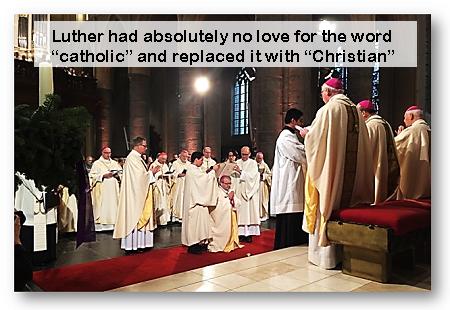
The Intention: The Breadth of the Church←⤒🔗
One cannot draw a direct line from the word “catholic” in its confessional use to its use in the Bible. The word katholikos is a Greek word, to be sure: it can even be found in the New Testament. The only thing is, this word as it used there says nothing specific about the church. In Acts 4:18 we read that the disciples received a command from the Jewish authorities to keep “totally” – using the word katholou – quiet, and not to teach or speak in the name of Jesus. The meaning there is only the broad sense of “completely” or “totally.”
What did the church of the first centuries want to do by applying this concept to the church of Christ? The first thing was that people wanted to make clear that the church was not only a local organization, but that it was a whole that transcended all local churches. The local churches are oriented to the breadth of the Christian church. One local church was therefore also “catholic.” It belonged to that one great whole.
What also was communicated by this usage was the confession that, in comparison with the national organization of God’s people in Israel, something new had now come. The church of Jesus Christ is no longer limited to Israel, but exists in the whole world and comes from all nations.
A third aspect, which already can be found in church history in the language of the Bishop Cyrillus of Alexandria in the fifth century, more specifically indicates content. With the word “catholic,” he meant that the church had received the complete tradition that it needed. It possesses all necessary doctrines, without distinction. As a consequence of this the church also shares in complete salvation through which all sins of body and soul are healed, and through which all virtues and good works are brought forth. This “catholic church” shares in all spiritual gifts.
These various aspects of “catholic” transcend a purely geographical or historical understanding of catholicity. It is more than not being nationally or geographically restricted. It has significance for more than a certain century. In it there is the realization that the church has a universal significance. There is a missionary consciousness in it, communicating that the message from which the church lives ought to resound to the farthest ends of the earth. The name of the Lord must be praised in song from where the sun rises to where it sets (see Ps 113:2f), and that throughout all history.
To the Heavens...←⤒🔗
In what has been said above, there is clearly more than simply an indication of the size of the church. That is the first thing: the church is worldwide and at the same time it belongs to all centuries. Thus, it stretches across the boundaries of the world and across the boundaries of time. But there is also the infinitely deep dimension of real catholicity. The Dutch theologian, H. Berkhof, wrote a book in 1962 about the catholicity of the church, and in it he connected the word catholic to the fullness which proceeds from Christ and makes its dwelling in the church. This sort of thought does justice to the meaning which has resounded in this word for centuries. If you replace the word “catholic” with “universal Christian,” it sounds too flat. The height of it has disappeared: the ascent heavenward, for Christ’s sake, and the descending of Gods angels via a ladder which descends to earth and reaches up to the heavens. You could say that the fullness of Christ, his person and work in service of the church, defines the church. For this reason it is catholic. It reaches as far as its Head, to Whom all authority has been given in heaven and on earth.
I hope it will be useful now to indicate more precisely which conflict between Rome and the Reformation circles around the catholicity of the church.

Roman Catholic Objections against Protestant Catholics←⤒🔗
In the sixteenth century, the Roman Catholic church emphasized that the church of the Reformation could not be catholic because the Reformation was limited to one part of the world, Europe, and then especially in the northern half. More than a thousand years before, Augustine had also used that argument in his struggle against the Donatist sect, which claimed to be the only true church in North Africa. A church which existed in only one area could not possibly be catholic, according to Augustine. Roman Catholic opponents of the Reformation also contended that the Roman Catholic Church was much bigger than the Reformation churches. How could a minority group be catholic? There is something worth considering in this argument. The Reformation has since spread across to all parts of the world, but the division between churches of the Reformation could well be reason to re-examine our being-a-church-in-isolation in the light of the one catholic church of Christ.
We are finally, however, not really impressed by the size of the organization and numbers of the Roman Catholic Church. The Reformers observed that even the largest church can let its connection with the church of the apostles slip away. They reasoned as follows. False teachings and practices have meant that the church of Rome has lost its continuity with the early church, while with the appearance of the Reformers, and the preaching of the apostolic gospel, the true church has become visible again. It is precisely that content of the gospel which is necessary in order to do justice to the catholic character of the church. The being of the church ought to be the same at all times. Liturgical vestments and forms, and a powerful organisation, are no guarantee that the church is continuing to be the same church. A famous Roman Catholic theologian such as Hans Küng has clearly recognized this in our time. The principle of the catholicity of the church lies in the identity of its essence.
Having established that the word catholic is not something exclusively Roman Catholic, I want to look at a number of biblical facts which make the meaning of catholicity clear. Even though the word catholicity cannot be found in the Bible, it is nonetheless a biblical word.
Christ, Head and Cornerstone of the Church←⤒🔗
The principle of the catholicity lies in the identity of the church. This is an important point. If the church is the body of Christ, and He is its Head, then this is decisive for the concrete details of the church’s existence. A human body never has a different identity than its head. Even in a passport or in a driving license this is as clear as day. A photo of someone’s head is sufficient to indicate the person involved.
If knowledge of Christ is decisive for the question of what is most essential for the church, then this can also be applied to the catholicity of the church. It is possible to speak of the “catholic” significance of Christ, even if this is not a normal use of language. Christ Jesus is not merely someone from a certain time or a certain place. When the Son of God becomes man, He remains the one in Whom “all the fullness of the Deity lives in bodily form” (Col 2:9). He is full of grace and truth; and from this fullness we have all received blessing upon blessing (John 1:14, 16). He does not have such limitations as we have! The range of Christ reaches as high as the heavens. Therefore you cannot apprehend the reality of the church by merely human characteristics. Even when Christ takes on our flesh and blood, He is the one who can say: “Before Abraham was born, I am!” (John 8:58). After his resurrection, He says boldly, as a lasting support for His own: “All authority in heaven and earth has been given to me” (Math 28:18). For this reason, his disciples are also called to be witnesses “to the ends of the earth”. (Acts 8:1) The Lord Jesus does not belong to a certain people or certain country. Is He not the Head of Creation? The title “firstborn over all creation” (Col. 1:15) points to His position as Lord of all creation, like the Son of a king is clothed with honour in order to exercise government on behalf of the Sovereign. After all, “all things were created by him and for him.” In the same chapter, Colossians 1, Christ’s high position is irrevocably bound with His being Head of the body, the church (Col.1:18).
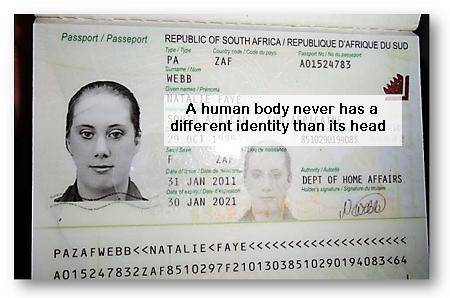
In its Head the congregation has, thus, the link to the most universal, the most cosmic scope of its existence. The church is not just an institution in society which can be found in the telephone book. For the church there is the book of the majesty of God in which the length and the breadth of creation, and the centuries of past and future are entrusted to us. The church breathes in this space of its Lord!
Nothing outside Him!←⤒🔗
All this does not imply that the church of Christ can ascribe greatness to itself in the midst of the world. Absolutely not! The church is, after all, nothing without its Head. Its eyes must remain fixed upon Him. The danger that threatens the church is surely that it can want to become something of great significance in and of itself, apart from the Lord Jesus. The church must always be directed back to a living by faith. That is the narrow way, which for the church means not letting itself be turned away from the gospel which is heard and proclaimed, not letting itself be tempted to human speculations and philosophy. These are contraband. If that happens, then there is agreement with the “elements of the world,” and not with Christ (Col.2:8). Such attention for itself, by itself, and its own possibilities of knowledge and experience make the church proud, blown up, full of empty air, so that our connection to the Head is lost (Col. 2:18, 19). These are dangers which threaten the church.
We ought to connect the greatness of the church, also when observing the dangers which threaten the church, with the word “catholic.” As long as the word catholic points to Christ, we are safe. In Him there is space worldwide, without Him nothing but hot air.
When the New Testament speaks of the “world,” kosmos in Greek, then the division between God and sin becomes visible. The “world” lies “under the control of the evil one” (1John 5:19). It does not know God (John 17:25). The church ought not to borrow anything from the world in that sense. If the church is catholic, and so has a worldwide orientation, then there is not any significance given to the “world” itself. Only the cross of Christ is central. The cross of Christ stood in the midst of this world (John 3:16-17; 2 Cor. 5:19; 1 John 2:2). For this reason He is the Lord of history, because He is not only the Lion of Judah but also the Lamb that was slain (Rev. 5:5). Therefore He is King into all eternity (Rev. 11:15). His promise opens up the perspective of a new heaven and a new earth (2 Peter 3:13).
Catholic and One←⤒🔗
The significance of Christ ensures us that the church knows about earlier boundaries which have been broken through. The separation between Israel and the heathens has been removed in Him. It is striking how Paul, in the chapter in which he emphasizes this (Eph 2:11-22), says that this has come about in Christ and through His Spirit. Christ is the cornerstone of the catholic structure which becomes visible under the new covenant (Eph 2:20). When someone comes to faith in Him, the promises of the Old Covenant are fulfilled, including the promise that in Abraham all nations of the earth will be blessed. This is no catholic or ecumenical aim in itself, but rather what is involved is the knowledge and the confession of salvation in Christ. At Pentecost, God’s great works were spoken of in all languages (Acts 2:8-11). The way in which the catholic church experiences its identity is via a vital connection between the Head and the members of the church. It is the bonds of faith in Christ, awakened and fed through the Word and through the Spirit.
It is possible that the church be spread across a very large area, and that the members of the congregation not know each other at all. Nevertheless, there is an awareness of belonging to each other, of being one body of Christ in Him. In the New Testament we are struck by how the apostolic letters are often circulated to different congregations. What is important for one congregation is important for another. If there is poverty in Jerusalem, Greece takes up a collection. The abundance of the one part of the body automatically pours over to help the other part (2 Cor. 8:14). It is one body, one Spirit, one Lord, one faith, one baptism, one God and Father of us all (Eph 4:4-6). For this reason, all party spirit and heresies are strangers to the essence of the church (1 Cor. 3:4f; 11:18-19).
See how the work of the Lord Jesus at Golgotha was directed at achieving unity! In His reconciliatory work, unity was brought back to that which had been torn apart and which is continually threatened by divisions. Doesn’t the Lord’s Supper speak of this, this unity in His blood? That’s why the apostles took so much trouble to prevent division in the church. The first official church “general synod” had to face this threat. The church leaders understood only too well that such division was a threat to the very being of the catholic church (see Acts 15:8-9; 1 Cor 12:13; Gal. 3:28; Philem.:16).
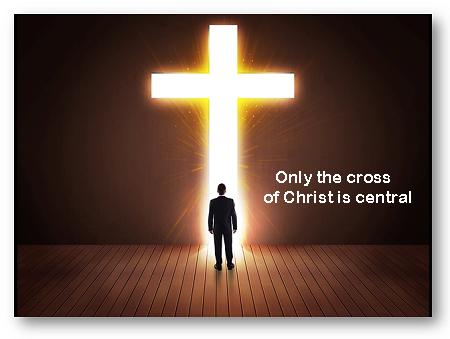
All from Him←⤒🔗
If we realize how close the bond is between Christ and His body, then it becomes clear how close the bond is between the being of the church and its catholic character. You cannot be a Christian on the small scale of a few like-minded people. Christ’s scale is catholic: as wide as the world, as far as the ends of history, and, at the same time, so intensely involved with the heart of salvation in the person of the Lord Jesus Himself. This is the reason why the church is having difficulties in a time and in a society which is trying to push back the gospel to the periphery of life. For the church it is only natural to open its doors wide to the world, and to witness boldly concerning Him, who has the right to subject everything and everyone to His rule.
G.C. Berkouwer once said rightly that the catholicity of the church must be tested by its calling to be the light of the world. Why should we crawl back into our shells, if our Head has the only message of healing which affects all mankind? And why should we be preoccupied in the world with things which pass away, without naming Him, who is eternal?
The heart conviction of Christians in this world ought indeed to be genuinely more catholic, more and more deeply conscious of Him in Whom we believe. Is He not superior to everything else?
The church’s being catholic, means that the church of Christ is a world-wide church, encompasses the whole of history and shares in the fullness of God’s grace in Christ. Moreover the catholic character of the church holds a purpose for the way in which the church views the outside. The church is called to be a light to the world, bearer of the message which speaks of healing for the whole of mankind. To confess that it is essential for the church to be catholic, simultaneously means: taking a look at yourself and your church in the mirror!
The Church and Our Church←⤒🔗
Since the last few centuries, the catholicity of the church has become an awkward theme, especially because the protestant church has broken up into so many denominations. To limit ourselves to the Netherlands: we have a book entitled De kaart van kerkelijk Nederland (‘The map of ecclesiastical Holland’). Every church fellowship is described in a few pages, but the total has become a sizeable tome.
For almost every Christian, in practice the word ‘church’ refers to the fellowship to which he or she belongs. In what way are you a member, what your responsibility in the church is, what you expect from the church, how the church appears to those outside and all such questions – they are questions which make us think of a certain church community. In what way this church is catholic, is not a question which quickly springs to the Christian mind.
In the church of the Reformation, this question could be fairly satisfactorily resolved. There was the Gereformeerde or Hervormde (in English both: Reformed) Church and it crossed nobody’s mind to hear anything different in that. It was not different. This church could have been called Christian Reformed Church with no concern at all. That was all the catholic, reformed church. In article 29 of the Belgic Confession, it was accepted that the Roman Catholic Church still existed, but with deep conviction and with good grounds, it was labelled as the false church. The true church recognizable by the true administration of the Word and the sacraments, and by the exercise of church discipline – was that of the Reformation. This meant that the catholic church was not the one which had the word ‘catholic’ in its name...
Moreover, in those days, Anabaptists and that sort of groups were active, which are also referred to on a number of occasions in the confessions. These were just as equally on a trail which could not be that of the church of Christ.
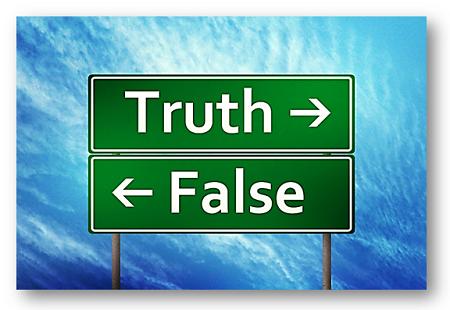
The distinction between the true and false church however, cannot easily be used in the middle of the discord in the church which came later. In the Reformed Churches (liberated), this was a tendency for years. Sometimes it was down to this: if a church did not immediately was ready to unite with the true (liberated) church, this was reason enough to consider this church a false church. It may be clear, that making absolute this way of thinking, as this was found with Rev. Hoorn, was vigorously denounced years ago by the Reformed (liberated) synod. There now seems to be a certain embarrassment to use the words ‘true church’...
In the meantime, the question remains of course: Is ‘our church’ the same as ‘the church’, the catholic church thus? Many have sought a solution for this question, also when they realised, that the label ‘false’ could not so easily be stuck onto other churches.
Multiformity?←⤒🔗
Various attempts have been made to answer this question. Abraham Kuyper formulated his ambitious design of the multiformity of the church. To him, the diversity of churches was not a sign of the body of Christ being divided, but of the special character of the church. The diversity of the people of God cannot be expressed in one body. The existence of different churches should not accuse us, but should make us praise the greatness of God...
These thoughts have little influence today. We do not regret this. He who knows a little church history, and sees how the splits and divisions have crept into the church, will come across more lamentations than reasons for worship. There can be thankfulness about the faithfulness and obedience God has left intact, but that a split was necessary for this – as with the Secession of 1834, cannot make a Christian cheerful.
One way in which practically the same direction is taken in our postmodern times, is that in which many people share the idea: I myself choose a church. Where I feel good, where I feel addressed, where I fit easily, that is where I want to belong! Individual feeling and personal taste help you find a way in the many churches. That there is so much choice, with many gradations between reformed this or that and evangelical is all the better. The question of the church of the Lord Jesus Christ, the catholic church which is God’s people, Christ’s body and the Temple of the Holy Spirit, means little to people at the moment. “Just as long as I feel at home. And if not – then I will look for something else...’
Invisible Church?←⤒🔗
The downside of such an attitude can be found where people happily declare that the actual church is invisible. The visible church only is the human organisation with all its shortcomings. There must of course be something like that, how else can there be ministers, missionary work and all those expressions of church and christian life which a solitary Christian cannot realise? The real church however is there where believers meet right across all church boundaries! The communion of the saints is the surprise which you definitely not find in the church! Spiritual affinity and unity is sometimes much easier to find outside of the church than within it... That this is – fortunately – often true, I acknowledge with thankfulness! Only, this must not be the happy ending of all church responsibility. ‘Long live the unity of the heart, and leave the toil and moil to the church’, cannot be the confession of the Christian.
Our confession also knows the invisible church. It is however, better to speak of the invisible side of the church. The church as God sees it, is not the same as the church which we see! In the church there are hypocrites, sanctimonious people, mixed in amongst the good (art. 29, Belgic Confession). Moreover, the church is spread out and scattered across the entire world, but still exists in one Spirit (art. 27, Belgic Confession). But that does not mean indifference as far as the ‘visible’ church is concerned. Every believer should join the church! And he who separates himself from the church, opposes God’s ordinance (art. 28, Belgic Confession)!
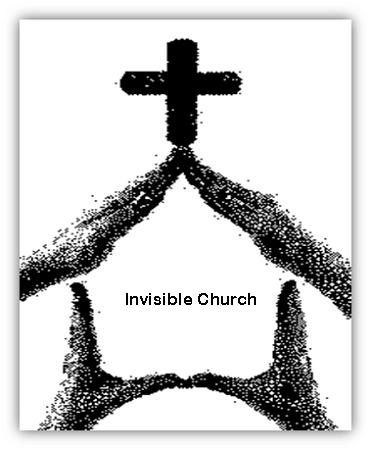
It is thus right to recognise the invisible aspect of the church. In saying this we acknowledge that we cannot see what is in the heart. Only God can do that. But the catholic church is very visible! Just as the New Testament continually speaks of very concrete, visible churches, even including their concrete and visible sins. The apostles do not distance themselves from this church! On the contrary, they wrestle for its purity; they rebuke and comfort, and they call for obedience, love and faithfulness.
This is in any case, also for us, the way in which we should deal with the visible catholic church. The shortcomings we discover in it, ask for self-reflection, certainly when we remember that the Lord sees things more clearly than we do. And he sees us also as part of the picture that not always leads only to joy. To run away and hide in the invisible is, in any case, not the way of the Spirit of Christ!
A Separate Covenant?←⤒🔗
In pointing out unusual ways of approaching the catholicity of the church – sometimes thus, also the avoidance of it – a distinct vision must be mentioned.
In the nineteenth century Dr. Ph. J. Hoedemaker was intensely busy with the church. Initially, he was a Kuyper supporter, later the relationship cooled off. Hoedemaker became the guide of the Hervormde grouping which distinguished itself by assuming a close connection between the church and the Dutch people. He was convinced of God’s special involvement with the Netherlands. By virtue of divine election, the Netherlands is a protestant, reformed nation! The church, in which baptism as sign of the covenant of God is administered from generation to generation, is a natural part of the national character. Hoedemaker did not deny a distinction between church and people, but to him God’s involvement with the church throughout the centuries is, in fact, an involvement with the Dutch people.
God has a covenant with the Dutch people, is his conviction. The church is therefore explicitly a national church. ‘All the church for all the people’ is the slogan. At this moment I especially want to point out that a romantic thought such as God’s private covenant with the Netherlands, cannot be born alongside the catholicity of the church. On the contrary, God has no separate covenant with whatever land, be it Scotland or South Africa where people have harboured similar thoughts.1 The church is catholic, and shall therefore want to look across the boundaries!
From the Lord←⤒🔗
It is evident: the closer the word ‘catholic’ comes to our ‘own’ church life, the more the tension increases in what you have to say about it. But it is useful to look deeper into this.
The word ‘church’ is derived from the Greek word kurias, Lord. Without the Lord there is no church. The church is His, it is the church of our Head, Christ. This also sounds constantly when we consider the meaning of ‘catholic’. Catholic had to do with the spreading of the one church through history and throughout the world, but also had everything to do with the content of the gospel. It is not the room and the time which are the norm, but the Lord, who gave His blood for the church, and who gives His Spirit and his Word to live in the church.
This constantly creates tension with the way in which we experience being the church, and how we express that. We honour those who have left their mark on the way the church thinks, and who have been decisive for the – separate, seceded or not – organisation of the church. We grasp on to historical facts and years which partly determine what our identity is: 1517, 1834, 1892. Church history is not insignificant! We honour the obedience of faith and the courage of our fathers in those moments which were important.
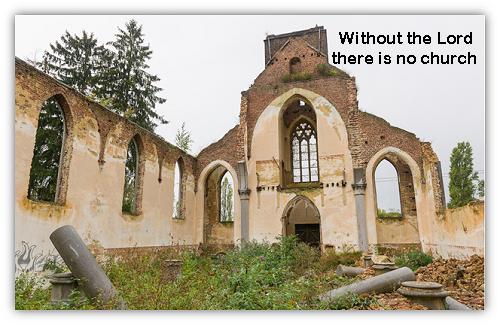
There is the tension immediately then. It is not difficult to recognise the surrender to the Lord in the Secession of 1834. There it was all about one thing: staying faithful to God and his Holy Word. In the same breath we can add, that in that same history, much which is human came along too. It was not all equally holy. Nevertheless, God preserved them. For me now, it is not so much about the history as about the way in which we deal with it. The catholic norm of the church shall urge us to be involved in that which is the Lord’s, and not in that which is ours. With this I also do not mean to say that we shall pass judgement on all the ins and outs of the past. This is much more about us being deeply convinced that the Lord judges all the ins and outs of how we live as church here and now...
It is history especially which teaches us what the reality of the church is today. There are no saints in the Roman Catholic sense of the word, no figures from history or today who can be our guide and our norm. The best that we can learn from the ‘true’ fathers is that their concern was for the Lord. In this sense, Paul’s words may show the way, when he says to Timothy that he must continue in what he had learned and been entrusted, because he knew from whom he had learned it (2 Tim. 3:14). It is clear from what follows that the essential emphasis falls upon faith in Christ Jesus!
Spiritual Character of the Church←⤒🔗
Because ‘catholic’ brings to mind the association with Rome, it always has the connotation of a bulwark. That catholic church, by means of human strength and influence is capable of controlling a worldwide bulwark. Protestants have understood that it should not be this way. That which is built up in this fashion is more like Babylon than like Jerusalem.
However – the fascination for the great structures and the impressive shape of the church is not strange to us either. The aura of a huge church building, the efficiency of a church organisation, the ability of prominent figures who are also noticed outside of their own circle, swiftly have something of: look at us, we hold a position in the world. The temptation to think politically, permanently threatens the church. The church of the Lord Jesus Christ is however, a spiritual community. Political strategy is completely out of order within it. I do not hesitate to include the work of a general synod in this. Who shall deny that forms of ambition for power have functioned also within our ‘own’ churches. There were – and are? – at least groups who wanted to ensure that one of them was placed in an influential position. In this way the church is taken out from the spiritual community. This is only found within ‘own’ circles. Church meetings are then a sort of necessary evil, but not gatherings in which spiritual life, and the fellowship of the saints can be found. Naturally, I am exaggerating by drawing this picture, but just as long as it is clear how great the distance between Jerusalem and Babylon, between the church and the world is. The church is about the Lord Jesus. That is the most characteristic of being catholic.
It is truly great if church meetings strike a pure note. Then the fellowship of saints is experienced there. Then the ‘calling upon the name of the Lord’ is not a formal issue which according to the church order should take place before the deliberations, but the expression that all participants together are willing to serve and to obey Him. I think that this is the reason why deputies should receive no instructions of their church councils, classis or particular synods, with regard to the way they vote. Being a church is being of the Lord. Then you may ask and desire together to understand His will.
Can you then not differ in opinion with each other? It would be folly not to recognise this. We already find this in the church of the New Testament. But what a beautiful example is given in the church meeting in Acts 15! They listen to each other. Their hearts come together, and the result is “it seemed good to the Holy Spirit and to us...” (Acts 15:28).
It can sometimes be necessary to make a distinction between main issues and side issues. Then it is of course important that we agree about the assessment! If on the grounds of certain external forms or habits, a spiritual judgement is given, things can go wrong. It is especially the catholic character of the church which requires spiritual clarity in the way we deal with one another.
For this reason it is spiritually unacceptable when ministers or church members within the church are actually written off. We can sometimes note, for example, that the Protestant Church of the Netherlands has become a worldly church, where truth and lies are received with just as much right, where the power of numbers weighs heavier than the spiritual authority of God’s Word. However, if things remain in our church as they always have been, then we are of the same un-spiritual sort. The catholic church is not like this.
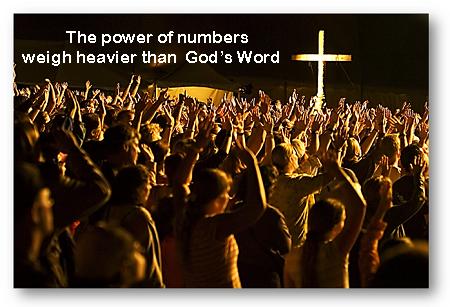
Inside and Outside of ‘the Church’←⤒🔗
The catholic church watches over the holiness of her service. This is evident in the admission to the sacraments. Here, the tension I mentioned earlier, is built up, for we can do nothing other than couple admission to the sacraments in the church of Christ to the witness and decisions of christian reformed church councils. There, in the church councils, the door to Christ’s table is opened and closed.
At the same time we know that the church of Christ is wider than ‘our’ church. We do not solve the problem of the different churches with an interdenominational policy. As though there could be various catholic churches! This opposes the word catholic, because it is contrary to the one body of Christ.
But the reality, which we accept so easily, exists. On all sorts of occasions within the church we behave as though the Christelijke Gereformeerde Churches form the body of Christ on earth. At other moments we meet earnestly about our contacts with ‘other’ churches and we pronounce judgements as though we ourselves are the Head. I do not say this as though I can produce a handbook of how we could do this better. It is too difficult for that! I do say it so that we are aware of the almost unbearable tension. Surely we cannot deal with the Lord’s business as though we were the boss? Because of the catholic character of the one body of Christ, the unity of his body ought to be taken more seriously. It should bring us to humble prayer, on our knees before God. The word ‘interdenominational’ is impossible to work with.
The same with an indifferent way of dealing with the questions of unity. An attitude such as ‘as far as I’m concerned, no thanks’ with regard to the search for the one catholic church, is one of the most unspiritual statements that I have ever heard about the church.
Love the Church←⤒🔗
It may be clear that I do not plead for indifference with regard to our ‘own’ church life. It is not a negative attitude which will teach us what the way of the Lord is. Let us be thankful for all the spiritual blessings which we have received in our church life. Our heritage is a heritage from the Lord. I do not hesitate to say that for one minute. For this reason, our love for the church is fitting!
But let our love constantly be subject to discipline by the Spirit of Christ. It should not be about love for what we have built up but about love for what He has given us in his mercy. That distinction is necessary. That which is ours, can never be catholic. That which is his, surely is. This shall point the way. A spiritual way, that takes us further that the powerlessness we keep coming across. Loving what is the Lord’s – that will last.

Add new comment